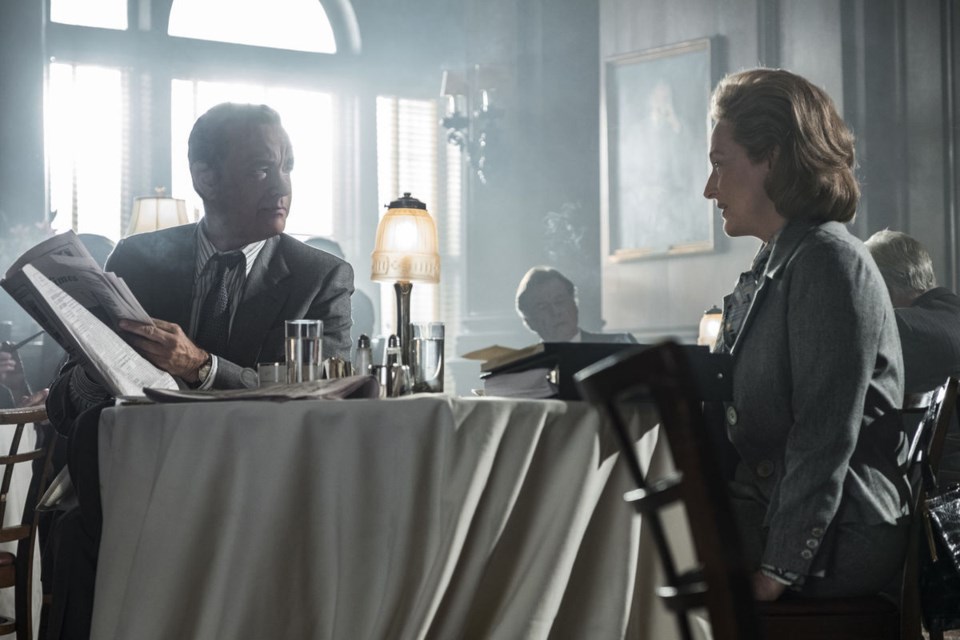The Post. Directed by Steven Spielberg. Starring Meryl Streep and Tom Hanks. Rating: 8 (out of 10)
It starts with a typewriter in the jungle and results in 4,000 pages of stolen government papers chronicling three decades of callous mishandling of the Vietnam War.
The Pentagon Papers revealed that presidents Truman, Eisenhower, Kennedy and Nixon oversaw the rigging of elections, sanctioned covert operations, violated the Geneva Convention, and, worst of all, promoted the war long after it became clear that the U.S. was in over its head.
“They knew we couldn’t win, and still sent boys to die,” says Kay Graham (Meryl Streep), owner of the Washington Post, in director Steven Spielberg’s new film, The Post.
Years previous, Kay’s father passed responsibility for the family paper to his son-in-law upon his retirement, but ownership fell to Kay anyway after her husband’s suicide.
That left Kay as publisher, the lone woman in a male-dominated profession. A pack mentality is keenly felt in scenes where Kay is surrounded, encircled by the men in her company.
“When you’re told time and time again that you’re not good enough ... it’s hard not to let yourself think it’s true”.
Just when Kay’s paper is going public on the stock exchange, the mighty New York Times scoops the story of the Pentagon Papers, only to be shut down by a cease-and-desist order from the White House.
So when reporter Ben Bagdikian (Better Call Saul’s Bob Odenkirk) tracks down a copy of the secret documents, Kay is presented with a moral quandary: with her paper perpetually second fiddle to the Times, does she run the top-secret material, risking jail time and the recent public offering of the paper to investors?
Editor Ben Bradlee (Tom Hanks) is eager to take that risk: “the only way to assert the right to publish is to publish,” he cries, while the reporters threaten to quit if the story doesn’t run.
Kay weighs her options, balancing her friendship with the likes of Secretary of State Bob McNamara (Bruce Greenwood) and the late J.F.K. with journalistic integrity.
Freedom of the press versus government supremacy: the argument for censorship all came down -- then as today -- to the money; on the “for” side was the need of the press “to serve the governed, not the governors”.
The film is stuffed with fine actors: Tracy Letts (a long-shot Oscar contender for Lady Bird), Bruce Greenwood as Secretary of Defense Bob McNamara, Sarah Paulson, Bradley Whitford, and Michael Stuhlbarg (who is in at least three of this year’s most critically acclaimed films), among others.
The Pentagon Papers marked a turning point for the reputation of the Post, as well as the end of Kay’s uncertainty about her fitness for the job she had inherited.
And so it’s a coming-of-age story of sorts, with Streep playing all of Kay’s insecurities and hesitation to perfection.
There are a few memorable shots: a covert pay-phone call beside a parking garage ramp; three newsmen grabbing copies of the morning paper, which promptly blow into the wind.
But overall it’s understated cinematography from Janusz Kaminski, heavy on those ’70s close-ups.
And there are some beautiful typesetting scenes and vintage newsroom bits -- print porn -- for those of us old enough to remember such things, but I predict that what everyone will react to are quaint catchphrases like “the integrity of the presidency” and “responsibility to the readers.”
It’s hard not to get misty for this elegy to a time when the truth mattered, before the era of “fake news” and “alternative facts”.
Director Steven Spielberg felt so strongly in the timeliness of the material that he briefly halted post-production of next summer’s big budget Ready Player One in order to shoot The Post.
The film’s gestation was lightning fast: the first screenings of the film took place a scant nine months after Spielberg first read Liz Hannah’s script.
With freedom of the press under attack in the U.S. and elsewhere on a daily basis, the urgency that propelled The Post into theatres feels warranted.



